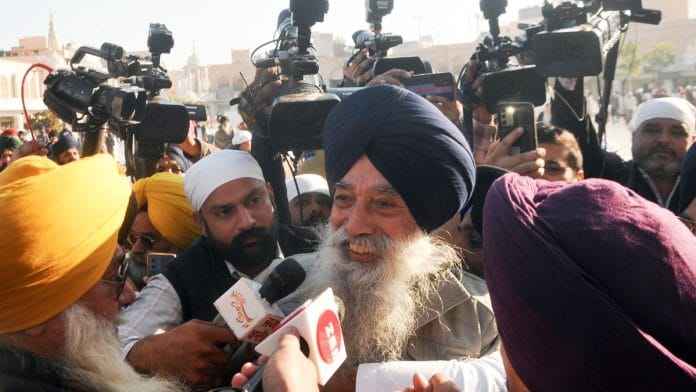Punjab, a border state with a history of social strife, political turmoil, terrorism, and separatism, is on the boil again. The Aam Aadmi Party–ruled state is not easy to administer, especially by a greenhorn in politics. Recently, former Deputy Chief Minister Sukhbir Singh Badal was declared ‘tankhaiya’—an indictment by the Akal Takht, the supreme religious body for Sikhs—and asked to undertake cleaning service at a gurudwara as repentance. These events have triggered a religio-political slugfest that could lead to political instability and serious challenges to national security.
The 62-year-old former deputy chief minister was ordered to perform the service of ‘sewadar’ at Takht Kesgarh Sahib, Takht Damdama Sahib, and Darbar Sahib in Muktsar and Fatehgarh Sahib, besides the Golden Temple in Amritsar, for two days each. The Akal Takht has doled out the punishment for his alleged acts of omission and commission during 2007-2017.
On the second day of Badal’s punishment at the Golden Temple, one of the most sacred and historic Sikh shrines, he narrowly missed an assassination attempt by one Narain Singh Chaura. Chaura is an activist of the Khalistan movement and reportedly one of the founding members of the Khalistan Liberation Army (KLA), who was also alleged to be the mastermind of the 2004 Burail jailbreak in Chandigarh. There are more than 21 cases registered against him.
Two aspects of these events should worry the state and central governments. One is the overarching influence of a religious body like the Akal Takht in deciding the fate of a political leader, so far as to cause their quitting as the head of the party. Second, and more serious due to its implications on national security, is the strategic space anti-national and anti-social elements gain in a state infamous for its delicate social balance.
The Akal Takht’s reprimanding of the former chief minister, the firing incident, and the likely political fallout of these events do not augur well for a state that shares borders with a country highly inimical to India’s national interest and security.
Also read: It’s jihadists vs secularism in Syria again. Aleppo crisis is a dangerous new turning point
Prevent revival of terrorism
The Union government and the state security agencies need to establish a foolproof mechanism to collect and analyse intelligence inputs, and take appropriate action. Given the seriousness of the Akal Takht’s decision in a politically surcharged situation, intelligence agencies should have been on high alert and well–prepared to prevent such incidents.
The fact that a shooting takes place in a high-security shrine like the Golden Temple reveals the chinks in our internal security armour and calls for punitive action against those responsible for the intelligence failure. Issues pertaining to national security and social cohesion in Punjab need intervention at the highest level; they are too serious to be left to the wisdom (or the lack of it) of the state government alone.
Today, the so-called Khalistan forces are overactive in the state as well as outside the country in Canada, the UK, and other Western capitals, enjoying undue patronage from a section of the political dispensations. At such a time, terrorist outfits like the KLA, Babbar Khalsa International, and Khalistan Tiger Force getting a foothold in Punjab will prove highly detrimental to peace and harmony.
As in the case of Sri Lanka where Tamil moderates were the first target for LTTE (Liberation Tigers of Tamil Eelam), the moderate population in Punjab and other sensitive areas will also be the first to face the wrath of terror outfits.
The Bhartiya Janata Party-Shiromani Akali Dal (BJP-SAD) government was able to maintain harmony in the state and keep terrorism at its lowest level. There were numerous attacks on Hindu activists, Churches, moderates among the Sikh politicians, and even Congress activists who spoke against terrorists.
A religious body like the Akal Takht, generally presided over by highly trained and respected individuals with deep religious and spiritual orientation, is expected to be apolitical and above sectarian politics. They should be aware of the dangers posed by radical elements in the religious order that could take undue advantage of devotion and faith.
The situation in Manipur, another state in the East that shares borders with Myanmar, is already on the boil, seriously affecting internal security, external trade, the Look East-Act East policies, and social harmony. The last thing New Delhi should have on its internal security agenda is the revival of terrorism in Punjab, which would give an easy handle to an inimical neighbour to dabble in our domestic politics.
The author is the former editor of ‘Organiser’. He tweets @seshadrichari. Views are personal.
(Edited by Prasanna Bachchhav)






